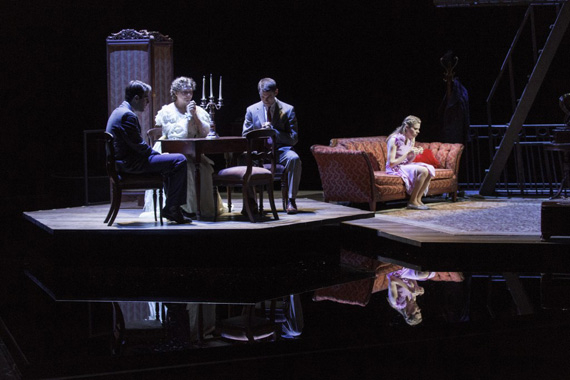The Glass Menagerie

(© Michael J. Lutch)
The Wingfield apartment exists in a void, floating in space and completely surrounded by a dark reflective pool that is simultaneously terrifying and alluring. The fire escape the family uses to get in and out of their little flat seems to extend forever up into that void: a possible way out of this limbo or a stairway into oblivion. In reality, the biggest threat posed by this set is a stain to your clothes: the reflective pool is created by black ink in water. "Don't touch it," warns an exasperated-looking usher if you approach before curtain or during intermission. Apparently, too many audience members have been perilously drawn to the void, walking away with telltale ink stains as badges of their curiosity.
It's an apt metaphor for this play about a man who does journey beyond the confines of home yet still carries the stain of guilt about those he left behind. The most autobiographical of Tennessee Williams' plays and the one that made him a household name, The Glass Menagerie is being revived for the sixth time on Broadway (original production: 1945), this time at the Booth Theatre. This stellar production comes via Boston's American Repertory Theater. Under the economical direction of John Tiffany, it is well-acted and boldly imagined — full of magic bubbling just under the surface.
A memory play, The Glass Menagerie is told from the perspective of Tom Wingfield (Zachary Quinto). It's the late 1930s and he lives in a cramped apartment in St. Louis with his needy mother, Amanda (Cherry Jones), and his painfully shy sister, Laura (Celia Keenan-Bolger). Since Mr. Wingfield skipped town long ago, the whole family is dependant on the $65 a month that Tom brings home from the warehouse where he begrudgingly works. Afraid that Laura, who has a limp and does little else but polish her glass animals (the titular menagerie), will become an old maid, Amanda beseeches Tom to bring home a nice non-alcoholic man from the warehouse to meet Laura. Tom chooses Jim O'Connor (Brian J. Smith), a former high school superstar now past his prime. Naturally Amanda piles all her eggs in the basket of this gentleman caller, hoping that he will be the one to snatch up her shy daughter. It's the perfect recipe for disappointment, an emotion upon which Amanda seems to simultaneously feed and falter.
Jones is brilliant as Amanda. Rather than the overbearing harpy, Jones opts for a weepy sack of tears and sentiment. Every word and gesture feels carefully calibrated to extract guilt. She tells Tom that all she wants is "success and happiness for my precious children," yet all of her actions elicit the exact opposite. An audible gasp from the audience greets her second-act entrance, in which she is decked out in a cupcake wrapper of a dress that wouldn't look out of place at Tara. It is ridiculous to the extreme, but Amanda couldn't look happier to be in it. With her over-the-top emotions and harlequin getup, by the final scene she transforms into Pagliacci.
Not at all clownish but infinitely more sympathetic is Keenan-Bolger's Laura. The petite actress embodies the shy girl who lives in a state of suspended adolescence. You really want her to get beyond this place, but it is clear that she could easily wither outside this hermetically sealed environment. She has none of the frustrated drive of her brother.
With his rounded shoulders and isolated limbs, as Tom, Quinto takes on the form of a dancer. This is Tennessee Williams as choreographed by Bob Fosse. He can barely contain his restlessness. "I'm starting to boil inside," he says, and you can see it. In this production, at least, he seems to have found an outlet for his bridled energy: His disheveled appearance when he ascends the fire escape with Jim suggests a physical intimacy between the two men that goes beyond that commonly shared by coworkers. If Tom left the apartment wearing a tie, why would it be removed when he returns with Jim?
"Expressionism and all other unconventional techniques in drama have only one valid aim, and that is a closer approach to the truth," writes Williams in his production notes. Certainly the author was well-known for his love of rough trade, and since Tom (Williams' real first name was Thomas, not Tennessee) is the closest thing to a surrogate for him in any of his plays, it stands to reason that this is a pretty accurate representation of the truth. This production leans into the play as autobiography: With his lilting drawl effortlessly spouting purple prose, Quito is eerily reminiscent of Williams.
The overwhelming emotion of The Glass Menagerie is guilt: Laura's guilt for wasting the $50 they saved for her business-college tuition, Amanda's guilt for not choosing a more reliable husband, Jim's guilt for kissing Laura when he already has a fiancée, and Tom's guilt about everything. His remorse about abandoning his poor sister is particularly potent in this production and is only exacerbated by the potential sexual liaison between Tom and Jim. Tiffany's bold and deliberate choices have paid off, drawing out the truth of this text in ways that may not have been possible for previous generations of theatergoers.











